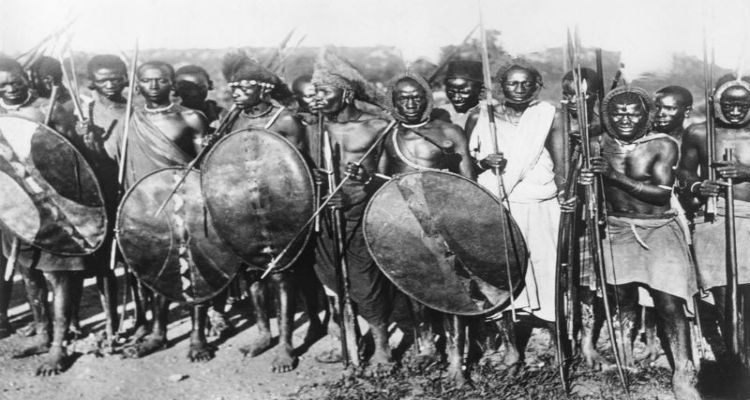The Maji Maji War in Tanganyika (modern-day Tanzania), beginning in July 1905 and ending in July 1907, was the most significant African challenge to German colonial rule. The war lasted two years and involved people over 10,000 square miles.
During the “scramble for Africa” that began with the Berlin Conference of 1884–85, four major regions in Africa were invaded by Germany, including Tanganyika (modern-day Tanzania), Togo, Cameroon and Namibia. All four were sites of conflicts between African people and the German colonial troops called “Schutztruppe.” Tanzania had been invaded largely through the efforts of the German Colonization Society, founded by Karl Peters. When Germany established its control over Tanzania by 1898, it imposed a particularly violent regime in order to control the population, including a policy of killing kings who resisted German occupation. This earned Peters, the name “Milkono wa Damu,” meaning “Man with Blood on His Hands.” Throughout this period of German occupation, the Tanzanian people were subjected to high taxation and a system of forced labor, whereby they were required to grow cotton and build roads for the European invaders.
These German policies were not only unpopular, they also had serious effects on the lives of the Tanzanian people changing the social fabric of the society. Many Tanzanians were reduced to manual labor on plantations run by the Germans, losing their independence and former lifestyles. Also, since men were forced away from their homes to work, women were forced to assume some of the traditional male roles.
During the summer of 1905, East Africa became the scene of a major historical battle. A spirit medium named Kinjikitile Ngwale claimed to be possessed by a snake spirit called Hongo and to know a secret, sacred liquid “war medicine” that could repel German bullets called “Maji Maji,” which means “sacred water.” Ngwale began calling himself Bokero and insisted that the people of the region were called to drive the Germans out. With such a weapon, many Tanzanian nations like the Ngori, Yao, and Bena joined the uprising. As such it was the first significant example of inter-African cooperation in the battle against colonial control.
The followers of Bokero’s movement were poorly armed with few rifles and muskets. They relied more on arrows and spears, some of which were poisoned. However, they were numerous and believed that they could not be harmed because the Germans’ bullets would turn to water. The Maji Maji warriors attacked in the open in a massive wave attack depending upon the “war medicine” to protect them. Initially, they attacked small outposts and damaged cotton plants. On July 31, 1905, Matumbi men marched on Samanga and destroyed the cotton crop as well as a trading post. Kinjikitile Ngwale was arrested and hanged for treason. Before his execution, he declared that he had spread the medicine of the rebellion throughout the region.
The revolution quickly spread through the southern area of Tanzania. Missions, trading posts and plantations were attacked and destroyed. The German forces were powerless to contain it, one-fifth of the invaded region soon was in the hands of the Maji Maji warriors.
The apex of the war came at Mahenge in August 1905 where several thousand Maji Maji warriors attacked but failed to overrun a German stronghold. On October 21, 1905 the Germans retaliated with an attack on the camp of the unsuspecting Ngoni people who had recently joined the war. The Germans killed hundreds of men, women, and children. This attack marked the beginning of a brutal counteroffensive that left an estimated 75,000 Maji Maji warriors dead by 1907. The Germans had also inflicted biological war on the Tanzanian people as well, taking the women and infecting them with sexually transmitted diseases that spread and devastated families and communities.
The end of the war was followed by a period of famine, known as the Great Hunger (Njaa), caused in large part by the scorched-earth policy advocated by Gustav Adolf von Götzen.
The suppression of the Maji Maji people changed the history of southern Tanzania. Although the Maji Maji War was ultimately unsuccessful, it forced Kaiser Wilhelm’s government in Berlin to institute reforms in the invaded African territories as they realized the potential cost of their brutality. Furthermore, the war became a focal point in the history of the region. Later Tanzanian nationalists used it as an example of the first stirrings of Tanzanian nationalism, a unifying experience that brought together all the different peoples of Tanzania under one leader in an attempt to establish a nation free from foreign domination.
Source:
https://atlantablackstar.com/2014-07-31/great-uprising-facts-maji-maji-rebellion/
https://en.wikipedia.org/wiki/Maji-Maji-Rebellion
http://www.blackpast.org/maji-maji-uprising-1905-1907



